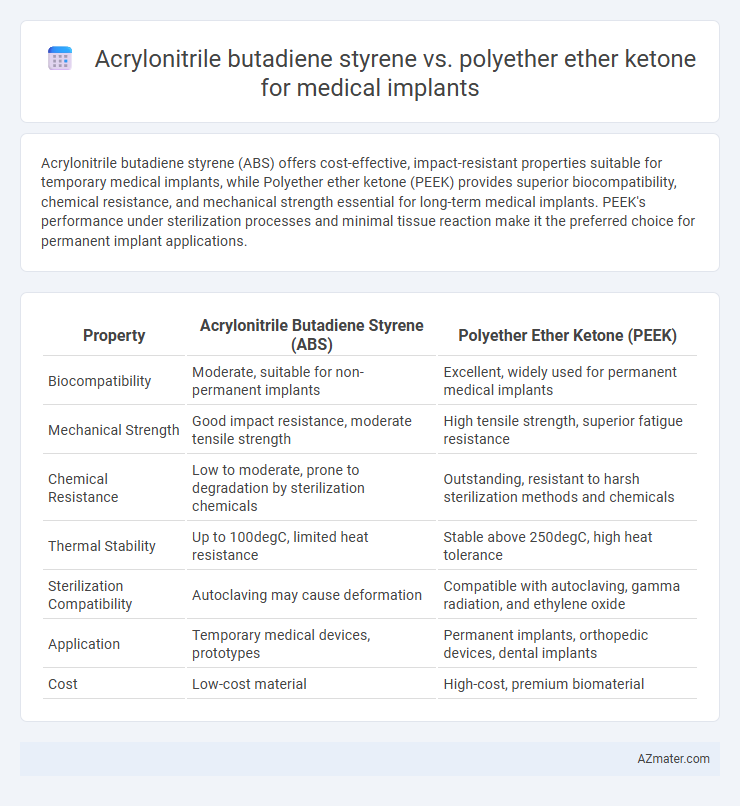Acrylonitrile butadiene styrene (ABS) offers cost-effective, impact-resistant properties suitable for temporary medical implants, while Polyether ether ketone (PEEK) provides superior biocompatibility, chemical resistance, and mechanical strength essential for long-term medical implants. PEEK's performance under sterilization processes and minimal tissue reaction make it the preferred choice for permanent implant applications.
Table of Comparison
| Property | Acrylonitrile Butadiene Styrene (ABS) | Polyether Ether Ketone (PEEK) |
|---|---|---|
| Biocompatibility | Moderate, suitable for non-permanent implants | Excellent, widely used for permanent medical implants |
| Mechanical Strength | Good impact resistance, moderate tensile strength | High tensile strength, superior fatigue resistance |
| Chemical Resistance | Low to moderate, prone to degradation by sterilization chemicals | Outstanding, resistant to harsh sterilization methods and chemicals |
| Thermal Stability | Up to 100degC, limited heat resistance | Stable above 250degC, high heat tolerance |
| Sterilization Compatibility | Autoclaving may cause deformation | Compatible with autoclaving, gamma radiation, and ethylene oxide |
| Application | Temporary medical devices, prototypes | Permanent implants, orthopedic devices, dental implants |
| Cost | Low-cost material | High-cost, premium biomaterial |
Introduction to Medical Implant Materials
Acrylonitrile butadiene styrene (ABS) and Polyether ether ketone (PEEK) represent two distinct classes of polymers used in medical implant materials, each offering unique properties tailored to specific applications. ABS is a thermoplastic polymer valued for its ease of fabrication, impact resistance, and cost-effectiveness, making it suitable for temporary implants and prototype devices. In contrast, PEEK exhibits superior mechanical strength, chemical resistance, biocompatibility, and stability at high temperatures, making it ideal for long-term, load-bearing implants such as spinal cages and joint replacements.
Overview of Acrylonitrile Butadiene Styrene (ABS)
Acrylonitrile Butadiene Styrene (ABS) is a thermoplastic polymer known for its toughness, impact resistance, and ease of fabrication, making it a popular material in medical device manufacturing. ABS offers good machinability and chemical resistance but has limited biocompatibility and lower sterilization tolerance compared to Polyether ether ketone (PEEK). Its mechanical properties and affordability position ABS as suitable for non-implantable medical components rather than long-term implantable devices.
Overview of Polyether Ether Ketone (PEEK)
Polyether ether ketone (PEEK) is a high-performance thermoplastic polymer extensively used in medical implants due to its exceptional biocompatibility, mechanical strength, and chemical resistance. PEEK demonstrates excellent fatigue resistance and can withstand sterilization processes without degradation, making it suitable for load-bearing orthopedic and spinal implants. Its radiolucency allows clear imaging post-implantation, which is a significant advantage over acrylonitrile butadiene styrene (ABS), commonly limited by lower mechanical properties and lesser sterilization compatibility.
Biocompatibility Comparison: ABS vs PEEK
Polyether ether ketone (PEEK) exhibits superior biocompatibility compared to Acrylonitrile Butadiene Styrene (ABS), making it a preferred material for medical implants due to its inert nature and resistance to degradation in bodily fluids. PEEK's high chemical stability prevents adverse tissue reactions, whereas ABS can release toxic degradation products that may trigger inflammation or immune responses. The enhanced biocompatibility of PEEK supports long-term implant integration and reduces complications, establishing it as an optimal choice in biomedical applications.
Mechanical Properties: Strength, Durability, and Flexibility
Acrylonitrile butadiene styrene (ABS) offers moderate strength and good impact resistance, making it suitable for non-load-bearing medical implants requiring flexibility and ease of fabrication. Polyether ether ketone (PEEK) exhibits superior mechanical strength, exceptional durability, and high resistance to wear and chemical degradation, ideal for load-bearing orthopedic and spinal implants. PEEK's high flexural modulus and fatigue resistance outperform ABS, providing long-term reliability in demanding physiological environments.
Sterilization Resistance and Chemical Stability
Polyether ether ketone (PEEK) exhibits superior sterilization resistance compared to acrylonitrile butadiene styrene (ABS), maintaining structural integrity under autoclaving, gamma irradiation, and ethylene oxide sterilization methods critical for medical implants. Chemical stability of PEEK is highly resistant to hydrolysis, acids, and organic solvents, whereas ABS tends to degrade or deform upon exposure to aggressive sterilization chemicals and prolonged contact with bodily fluids. These properties make PEEK a more reliable material for long-term implantation requiring repeated sterilization cycles and exposure to various chemical environments.
Performance in Implantable Medical Devices
Acrylonitrile Butadiene Styrene (ABS) offers good toughness and impact resistance but lacks the chemical stability and high-temperature resistance required for long-term implantable medical devices. Polyether ether ketone (PEEK) demonstrates superior biocompatibility, chemical inertness, and mechanical strength, making it ideal for load-bearing implants such as spinal cages and orthopedic devices. PEEK's ability to withstand sterilization processes without degradation significantly enhances its performance and durability in medical implants compared to ABS.
Cost Analysis: ABS vs PEEK
Acrylonitrile butadiene styrene (ABS) offers a significantly lower cost compared to polyether ether ketone (PEEK), making it a budget-friendly option for medical implants with basic structural requirements. PEEK's higher expense is justified by its superior mechanical strength, biocompatibility, and resistance to sterilization processes, which are critical for long-term implant performance. Cost analysis reveals that while ABS is suitable for temporary or non-load-bearing implants, PEEK is preferred for high-stress applications despite its premium price.
Regulatory Compliance and Approvals
Acrylonitrile butadiene styrene (ABS) faces challenges in medical implants due to its limited biocompatibility and difficulties meeting stringent FDA and ISO 10993 regulatory standards. Polyether ether ketone (PEEK) is widely favored for medical implants because of its proven biocompatibility, chemical resistance, and compliance with FDA 510(k) clearances and ISO 13485 certification requirements. Regulatory approvals for PEEK support its extensive use in spinal, dental, and orthopedic implants, while ABS remains primarily restricted to non-implantable medical device components.
Conclusion: Choosing the Optimal Material for Medical Implants
Acrylonitrile butadiene styrene (ABS) offers cost-effectiveness and ease of fabrication but lacks the biocompatibility and chemical resistance required for long-term medical implants. Polyether ether ketone (PEEK) provides superior mechanical strength, biocompatibility, and resistance to sterilization processes, making it an optimal choice for durable, high-performance medical implants. Selecting PEEK ensures enhanced patient safety and implant longevity, crucial for critical medical applications.

Infographic: Acrylonitrile butadiene styrene vs Polyether ether ketone for Medical implant
 azmater.com
azmater.com